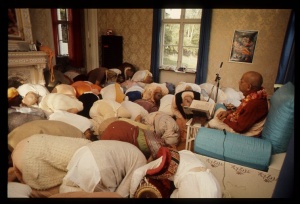SB 7.12.1: Difference between revisions
m (1 revision(s)) |
(Vanibot #0018 edit: make synonym terms in Sanskrit italic in SB - Vanisource) |
||
| Line 1: | Line 1: | ||
{{info | {{info | ||
|speaker= | |speaker=Nārada Muni | ||
|listener=King | |listener=King Yudhiṣṭhira | ||
}} | }} | ||
[[Category:Srimad-Bhagavatam - Canto 07 Chapter 12|s01 ]] | |||
[[Category:Bhagavatam Verses Spoken by Narada Muni - Vanisource|071201]] | |||
<div style="float:left">'''[[Srimad-Bhagavatam]] - [[SB 7|Seventh Canto]] - [[SB 7.12: The Perfect Society: Four Spiritual Classes|Chapter 12: The Perfect Society: Four Spiritual Classes]]'''</div> | |||
<div style="float:right">[[File:Go-previous.png|link=SB 7.12 Summary]] '''[[SB 7.12 Summary]] - [[SB 7.12.2]]''' [[File:Go-next.png|link=SB 7.12.2]]</div> | |||
{{RandomImage}} | |||
==== TEXT 1 ==== | ==== TEXT 1 ==== | ||
<div | <div class="verse"> | ||
śrī-nārada uvāca | :śrī-nārada uvāca | ||
brahmacārī guru-kule | :brahmacārī guru-kule | ||
vasan dānto guror hitam | :vasan dānto guror hitam | ||
ācaran dāsavan nīco | :ācaran dāsavan nīco | ||
gurau sudṛḍha-sauhṛdaḥ | :gurau sudṛḍha-sauhṛdaḥ | ||
</div> | </div> | ||
| Line 18: | Line 23: | ||
==== SYNONYMS ==== | ==== SYNONYMS ==== | ||
<div | <div class="synonyms"> | ||
śrī-nāradaḥ | ''śrī-nāradaḥ uvāca''—Śrī Nārada Muni said; ''brahmacārī''—a brahmacārī, a student living at the residence of the guru; ''guru-kule''—at the residence of the guru; ''vasan''—by living; ''dāntaḥ''—continuously practicing control of the senses; ''guroḥ hitam''—only for the benefit of the guru (not for one's personal benefit); ''ācaran''—practicing; ''dāsa-vat''—very humbly, like a slave; ''nīcaḥ''—submissive, obedient; ''gurau''—unto the spiritual master; ''su-dṛḍha''—firmly; ''sauhṛdaḥ''—in friendship or good will. | ||
</div> | </div> | ||
| Line 25: | Line 30: | ||
==== TRANSLATION ==== | ==== TRANSLATION ==== | ||
<div | <div class="translation"> | ||
Nārada Muni said: A student should practice completely controlling his senses. He should be submissive and should have an attitude of firm friendship for the spiritual master. With a great vow, the brahmacārī should live at the guru-kula, only for the benefit of the guru. | Nārada Muni said: A student should practice completely controlling his senses. He should be submissive and should have an attitude of firm friendship for the spiritual master. With a great vow, the brahmacārī should live at the guru-kula, only for the benefit of the guru. | ||
</div> | </div> | ||
__NOTOC__ | |||
<div style="float:right; clear:both;">[[File:Go-previous.png|link=SB 7.12 Summary]] '''[[SB 7.12 Summary]] - [[SB 7.12.2]]''' [[File:Go-next.png|link=SB 7.12.2]]</div> | |||
__NOTOC__ | |||
__NOEDITSECTION__ | |||
Revision as of 05:39, 1 December 2017

A.C. Bhaktivedanta Swami Prabhupada
TEXT 1
- śrī-nārada uvāca
- brahmacārī guru-kule
- vasan dānto guror hitam
- ācaran dāsavan nīco
- gurau sudṛḍha-sauhṛdaḥ
SYNONYMS
śrī-nāradaḥ uvāca—Śrī Nārada Muni said; brahmacārī—a brahmacārī, a student living at the residence of the guru; guru-kule—at the residence of the guru; vasan—by living; dāntaḥ—continuously practicing control of the senses; guroḥ hitam—only for the benefit of the guru (not for one's personal benefit); ācaran—practicing; dāsa-vat—very humbly, like a slave; nīcaḥ—submissive, obedient; gurau—unto the spiritual master; su-dṛḍha—firmly; sauhṛdaḥ—in friendship or good will.
TRANSLATION
Nārada Muni said: A student should practice completely controlling his senses. He should be submissive and should have an attitude of firm friendship for the spiritual master. With a great vow, the brahmacārī should live at the guru-kula, only for the benefit of the guru.